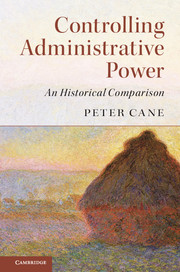Book contents
- Frontmatter
- Dedication
- Contents
- Preface
- Table of cases
- Table of legislation
- 1 Introduction: concepts and methodology
- 2 The English system of government
- 3 The US system of government
- 4 The Australian system of government
- 5 The development and institutional structure of control regimes
- 6 Administrative interpretation
- 7 Administrative fact-finding and policy-making
- 8 Administrative rule-making
- 9 Administrative adjudication
- 10 Private law controls
- 11 Controlling information
- 12 The New PublicManagement
- 13 Controlling the controllers
- 14 Concluding reflections on methodology and themes
- Bibliography
- Index
9 - Administrative adjudication
Published online by Cambridge University Press: 05 March 2016
- Frontmatter
- Dedication
- Contents
- Preface
- Table of cases
- Table of legislation
- 1 Introduction: concepts and methodology
- 2 The English system of government
- 3 The US system of government
- 4 The Australian system of government
- 5 The development and institutional structure of control regimes
- 6 Administrative interpretation
- 7 Administrative fact-finding and policy-making
- 8 Administrative rule-making
- 9 Administrative adjudication
- 10 Private law controls
- 11 Controlling information
- 12 The New PublicManagement
- 13 Controlling the controllers
- 14 Concluding reflections on methodology and themes
- Bibliography
- Index
Summary
Introduction
As we saw in Chapter 8, in US law administrative action falls into two mutually exclusive categories: rule-making and adjudication. These categories are, in turn, defined by the distinction between a ‘rule’ and an ‘order’. Adjudication is defined as a process that culminates in the making of an ‘order’. An order is defined as ‘the whole or a part of a final disposition, whether affirmative, negative, injunctive, or declaratory in form, of an agency in a matter other than rule-making but including licensing’. Although the APA's definition of a ‘rule’ includes a ‘statement of particular applicability’, and although a licence could probably be subsumed under that part of the definition of a rule that refers to a ‘statement of future effect designed to implement…law or policy’, an order is generally understood as being roughly equivalent to what, in English and Australian parlance, would be called a ‘decision’ as opposed to a rule. Decisions can be divided into two categories that may be called ‘initial’ and ‘appellate’, respectively. An appellate decision is one designed to resolve a dispute about an initial decision. The paradigm example is a decision of a court resolving a dispute between two parties, a citizen and a public agency, about a decision made by the agency. Paradigm examples of initial administrative decisions include decisions granting or denying benefits, and enforcement decisions. In US parlance, in the administrative context at least, ‘adjudication’ refers to both types of decision whereas in English and Australian parlance it generally refers only to appellate decisions.
In this chapter, Anglo-Australian usage is adopted. The term ‘adjudication’ (without qualification) will be used to refer to tripartite (appellate) dispute-resolution processes and the term ‘implementation’ will be used to refer to initial administrative decision-making. Implementation and adjudication involve essentially the same steps: finding facts, identifying norms and applying norms to facts. The significant difference between the two types of decision-making resides in the fact that appellate decision-making is directed to resolution of disputes whereas initial decision-making is not. The inclusive American sense of ‘adjudication’ will be referred to as ‘adjudication (in the broad sense)’.
Adjudication (in the broad sense) is divided into two categories: formal and informal.
- Type
- Chapter
- Information
- Controlling Administrative PowerAn Historical Comparison, pp. 325 - 367Publisher: Cambridge University PressPrint publication year: 2016



